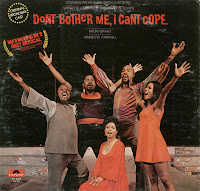Gil Scott-Heron - Pieces Of A Man (1971) (@320)
Another post prepared months ago... There isn't much to write about Scott-Heron rather than to copy the wiki paragraph about his tremendous infulence:
"The music of Scott-Heron's work during the 1970s influenced and helped engender later African-American music genres such as hip hop and neo soul. He has been described by music writers as "the godfather of rap" and "the black Bob Dylan". Chicago Tribune writer Greg Kot comments on Scott-Heron's collaborative work with Jackson, "Together they crafted jazz-influenced soul and funk that brought new depth and political consciousness to ‘70s music alongside Marvin Gaye and Stevie Wonder. In classic albums such as 'Winter in America' and 'From South Africa to South Carolina,' Scott-Heron took the news of the day and transformed it into social commentary, wicked satire, and proto-rap anthems. He updated his dispatches from the front lines of the inner city on tour, improvising lyrics with an improvisational daring that matched the jazz-soul swirl of the music". Of Scott-Heron's influence on hip hop, Kot writes that he "presag[ed] hip-hop and infus[ed] soul and jazz with poetry, humor and pointed political commentary". Ben Sisario of The New York Times writes that "He preferred to call himself a "bluesologist," drawing on the traditions of blues, jazz and Harlem renaissance poetics". Tris McCall of The Star-Ledger writes that "The arrangements on Gil Scott-Heron's early recordings were consistent with the conventions of jazz poetry – the movement that sought to bring the spontaneity of live performance to the reading of verse". On his influence, a music writer later noted that "Scott-Heron's unique proto-rap style influenced a generation of hip-hop artists". The Washington Post wrote that "Scott-Heron's work presaged not only conscious rap and poetry slams, but also acid jazz, particularly during his rewarding collaboration with composer-keyboardist-flutist Brian Jackson in the mid- and late '70s." The Observer's Sean O'Hagan discussed the significance of Scott-Heron's music with Brian Jackson, stating: "Together throughout the 1970s, Scott-Heron and Jackson made music that reflected the turbulence, uncertainty and increasing pessimism of the times, merging the soul and jazz traditions and drawing on an oral poetry tradition that reached back to the blues and forward to hip-hop. The music sounded by turns angry, defiant and regretful while Scott-Heron's lyrics possessed a satirical edge that set them apart from the militant soul of contemporaries such as Marvin Gaye and Curtis Mayfield."
Will Layman of PopMatters writes of the significance of Scott-Heron's early musical work, "In the early 1970s, Gil Scott-Heron popped onto the scene as a soul poet with jazz leanings; not just another Bill Withers, but a political voice with a poet’s skill. His spoken-voice work had punch and topicality. 'The Revolution Will Not Be Televised' and 'Johannesburg' were calls to action: Stokely Carmichael if he’d had the groove of Ray Charles. 'The Bottle' was a poignant story of the streets: Richard Wright as sung by a husky-voiced Marvin Gaye. To paraphrase Chuck D, Gil Scott-Heron’s music was a kind of CNN for black neighborhoods, prefiguring hip-hop by several years. It grew from the Last Poets, but it also had the funky swing of Horace Silver or Herbie Hancock—or Otis Redding. Pieces of a Man and Winter in America (collaborations with Brian Jackson) were classics beyond category". Scott-Heron's influence over hip-hop is primarily exemplified by his definitive single "The Revolution Will Not Be Televised," sentiments from which have been explored by various rappers, including Aesop Rock, Talib Kweli and Common. In addition to his vocal style, Scott-Heron's indirect contributions to rap music extend to his and co-producer Brian Jackson's compositions, which have been sampled by various hip-hop artists. "We Almost Lost Detroit" has been sampled by Brand Nubian member Grand Puba ("Keep On"), Native Tongues duo Black Star ("Brown Skin Lady"), and underground notable MF DOOM ("Camphor"). Scott-Heron's 1980 song "A Legend in His Own Mind" was sampled on Mos Def's "Mr. Nigga". The opening lyrics from his 1978 recording "Angel Dust" were appropriated by rapper RBX on the 1996 song "Blunt Time" by Dr. Dre. CeCe Peniston's 2000 song "My Boo" samples Scott-Heron's 1974 recording "The Bottle".
Among the most notable is rapper/producer Kanye West, who has sampled Scott-Heron and Jackson's "Home is Where the Hatred Is" and "We Almost Lost Detroit" for his song "My Way Home" and the single "The People," respectively, both of which are collaborative efforts between West and Common. Scott-Heron, in turn, has acknowledged West's contributions, sampling the latter's 2007 single "Flashing Lights" on his latest album, 2010's I'm New Here. Scott-Heron admitted ambivalence about his association with rap, remarking in 2010 in an interview for the Daily Swarm, "I don't know if I can take the blame for it", referring to rap music. He preferred the moniker of "bluesologist". Referring to reviews of his last album and references to him as the "godfather of rap", he said, "It’s something that’s aimed at the kids." He added, "I have kids, so I listen to it. But I would not say it’s aimed at me. I listen to the jazz station.”
review link: here
download link: here (mirrorcreator) and here (rapidshare)





